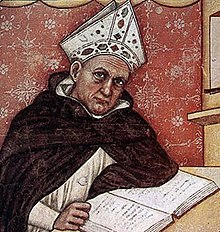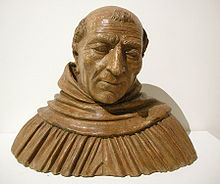Albertus Magnus
Saint Albertus Magnus, fresco, Tommaso da Modena, 1352, Treviso, Italy |
|
 (1193/1206 – November 15, 1280), also known as Albert the Great and Albert of Cologne, is a Catholic saint. He was a German Dominican friar and a bishop.
Those such as James A. Weisheipl and Joachim R. Söder have referred to
him as the greatest German philosopher and theologian of the Middle Ages, an opinion supported by contemporaries such as Roger Bacon.[1] The Catholic Church honours him as a Doctor of the Church, one of only 35 persons with that honor.
(1193/1206 – November 15, 1280), also known as Albert the Great and Albert of Cologne, is a Catholic saint. He was a German Dominican friar and a bishop.
Those such as James A. Weisheipl and Joachim R. Söder have referred to
him as the greatest German philosopher and theologian of the Middle Ages, an opinion supported by contemporaries such as Roger Bacon.[1] The Catholic Church honours him as a Doctor of the Church, one of only 35 persons with that honor.Biography
Albertus was born sometime before 1200 in Lauingen in Bavaria.[2] Contemporaries such as Roger Bacon applied the term "Magnus" to Albertus during his own lifetime, referring to his immense reputation as a scholar and philosopher.Albertus was educated principally at Padua, where he received instruction in Aristotle's writings. A late account by Rudolph de Novamagia refers to Albertus' encounter with the Blessed Virgin Mary, who convinced him to enter Holy Orders. In 1223 (or 1229) [3] he became a member of the Dominican Order, against the wishes of his family, and studied theology at Bologna and elsewhere. Selected to fill the position of lecturer at Cologne, Germany, where the Dominicans had a house, he taught for several years there, at Regensburg, Freiburg, Strasbourg and Hildesheim. In 1245 he went to Paris, received his doctorate and taught for some time as a master of theology with great success. During this time Thomas Aquinas began to study under Albertus.
Bust of Albertus Magnus by Vincenzo Onofri, c. 1493
 Albertus was the first to comment on virtually all of the writings of
Aristotle, thus making them accessible to wider academic debate. The
study of Aristotle brought him to study and comment on the teachings of
Muslim academics, notably Avicenna and Averroes, and this would bring
him into the heart of academic debate. He was ahead of his time in his
attitude towards science. Two aspects of this attitude deserve to be
mentioned: 1) he did not only study science from books, as other
academics did in his day, but actually observed and experimented with
nature (the rumours started by those who did not understand this are
probably at the source of Albert's supposed connections with alchemy and
witchcraft), 2) he took from Aristotle the view that scientific method
had to be appropriate to the objects of the scientific discipline at
hand.
Albertus was the first to comment on virtually all of the writings of
Aristotle, thus making them accessible to wider academic debate. The
study of Aristotle brought him to study and comment on the teachings of
Muslim academics, notably Avicenna and Averroes, and this would bring
him into the heart of academic debate. He was ahead of his time in his
attitude towards science. Two aspects of this attitude deserve to be
mentioned: 1) he did not only study science from books, as other
academics did in his day, but actually observed and experimented with
nature (the rumours started by those who did not understand this are
probably at the source of Albert's supposed connections with alchemy and
witchcraft), 2) he took from Aristotle the view that scientific method
had to be appropriate to the objects of the scientific discipline at
hand.In 1254 Albertus was made provincial of the Dominican Order,[4] and fulfilled the arduous duties of the office with great care and efficiency. During his tenure he publicly defended the Dominicans against attacks by the secular and regular faculty of the University of Paris, commented on St John, and answered what he perceived as errors of the Islamic philosopher Averroes.
In 1259 Albert took part in the General Chapter of the Dominican Order at Valenciennes together with Thomas Aquinas, masters Bonushomo Britto,[5] Florentius,[6] and Peter establishing a ratio studiorum or program of studies for the Dominican Order[7] that featured the study of philosophy as an innovation for those not sufficiently trained to study theology. This innovation initiated the tradition of Dominican scholastic philosophy put into practice, for example, in 1265 at the Order's studium provinciale at the convent of Santa Sabina in Rome, out of which would develop the Pontifical University of Saint Thomas Aquinas, Angelicum[8]
 In 1260 Pope Alexander IV made him Bishop of Regensburg,
an office from which he resigned after three years. During the exercise
of his duties he enhanced his reputation for humility by refusing to
ride a horse—in accord with the dictates of the Dominican order—instead
walking back and forth across his huge diocese. This earned him the
affectionate sobriquet, "boots the bishop," from his parishioners. After
his stint as bishop, he spent the remainder of his life partly in
retirement in the various houses of his order, yet often preaching
throughout southern Germany. In 1270 he preached the eighth Crusade in Austria.
After this, he was especially known for acting as a mediator between
conflicting parties (In Cologne he is not only known for being the
founder of Germany's oldest university there, but also for "the big
verdict" (der Große Schied) of 1258, which brought an end to the
conflict between the citizens of Cologne and the archbishop. Among the
last of his labors was the defense of the orthodoxy of his former pupil,
Thomas Aquinas,
whose death in 1274 grieved Albertus (the story that he travelled to
Paris in person to defend the teachings of Aquinas can not be
confirmed).
In 1260 Pope Alexander IV made him Bishop of Regensburg,
an office from which he resigned after three years. During the exercise
of his duties he enhanced his reputation for humility by refusing to
ride a horse—in accord with the dictates of the Dominican order—instead
walking back and forth across his huge diocese. This earned him the
affectionate sobriquet, "boots the bishop," from his parishioners. After
his stint as bishop, he spent the remainder of his life partly in
retirement in the various houses of his order, yet often preaching
throughout southern Germany. In 1270 he preached the eighth Crusade in Austria.
After this, he was especially known for acting as a mediator between
conflicting parties (In Cologne he is not only known for being the
founder of Germany's oldest university there, but also for "the big
verdict" (der Große Schied) of 1258, which brought an end to the
conflict between the citizens of Cologne and the archbishop. Among the
last of his labors was the defense of the orthodoxy of his former pupil,
Thomas Aquinas,
whose death in 1274 grieved Albertus (the story that he travelled to
Paris in person to defend the teachings of Aquinas can not be
confirmed).Albertus is frequently mentioned by Dante, who made his doctrine of free will the basis of his ethical system. In his Divine Comedy, Dante places Albertus with his pupil Thomas Aquinas among the great lovers of wisdom (Spiriti Sapienti) in the Heaven of the Sun. Albertus is also mentioned, along with Agrippa and Paracelsus, in Mary Shelley's Frankenstein, in which his writings influence a young Victor Frankenstein.
Albertus was beatified in 1622. He was canonized and proclaimed a Doctor of the Church on December 16, 1931 by Pope Pius XI and patron saint of natural scientists in 1941. St Albert's feast day is celebrated on November 15. According to Joan Carroll Cruz, his body is incorrupt.[10]



0 komentar:
Posting Komentar